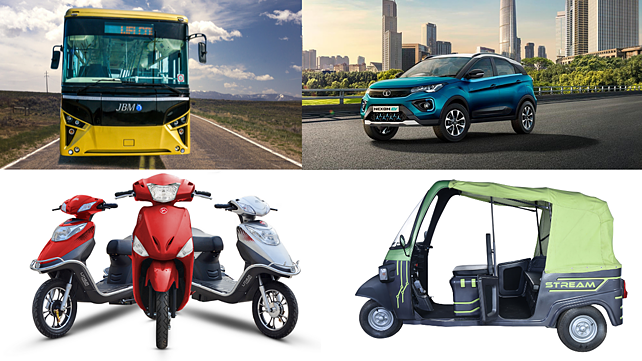
Industry bodies and players across the Electric Vehicle (EV) manufacturing ecosystem have hailed Maharashtra’s EV Policy 2021 as there are a plethora of incentives for demand, supply and charging infrastructure. With this, Maharashtra, the 16th Indian state to announce a comprehensive policy for EVs, aims to contribute to 10% of new vehicle registrations or 300,000 EVs a year by 2025.
According to the announcement, all the EVs sold in the state will not incur road tax and registration charges. In addition, vehicles sold without batteries will be eligible for 50% of the demand incentive, while the remaining incentive amount will go to the energy operator.
Besides, all the new government vehicles will be EVs from April 2022. It also aims to electrify 25% of public transport by 2025 in six urban centres such as Mumbai, Pune, Nagpur, Aurangabad, Amravati and Nashik. To support this, the state will set up 2,500 charging stations in urban areas and highways. The government will also offer property tax rebates for the residential owners, who install private charging infrastructure.
The maximum budgetary provision for ‘demand side’ and ‘charging infrastructure’ incentives is INR 930 crore for four years (2021-2025). The green tax levied on the re-registration of old vehicles, and fuel cess will fund the implementation of the EV policy.
A glimpse of the policy
The first 1,000 EV private/public passenger bus buyers, whose vehicles are registered in the state, will be eligible for user subsidy over a policy period of five years. Passenger buses registered in the state to private/public bus transport buyers, will be eligible for a 10% subsidy on the base price (maximum limit of INR 20 lakh per vehicle).
The first 100,000 EVs (70,000 two-wheelers, 20,000 three-wheelers and 10,000 four-wheelers) registered in the state – both private transporters and individual buyers – will get end-user subsidy over a policy period of five years.
A 15% subsidy (maximum limit of INR 5,000 for 2W, INR 12,000 for 3W and INR1 lakh for 4W) per vehicle to private transport and individual buyers for EVs registered in the state, on base price will be paid to the buyers.
All the subsidies will be transferred to the buyer’s bank account within three months of the purchase date, states the policy.
These proposed incentives are in addition to FAME II incentives and will be awarded to vehicle manufacturers based on the number of vehicles registered in Maharashtra.
Industry welcomes development
Commenting on the development, Sohinder Gill, Global CEO, Hero Electric & Director General, SMEV said the policy grants the EV industry the privilege to reach out to its potential customer base in the state. With the amendment of FAME II by the central government and now the individual state policies like this one have only encouraged the adoption of EVs in India.
The added subsidies from the government on batteries and overall vehicles, apart from encouraging battery makers to invest in the state, will only aid to the growing interest among investors and companies looking to make an entry into the manufacturing of parts for the segment, he said.
Shailesh Chandra, President, Passenger Vehicle Business Unit, Tata Motors said it is a welcome move and indeed a very strong resolve shown by the government towards EV adoption. Also, the support extended in increasing charging infrastructure will offer EV owners a hassle-free commute. This visionary policy will enable a faster transition to EVs, he added.
Naveen Munjal, MD, Hero Electric said he expects the shift towards EV mobility in the country to gain more traction in the coming few days. The policy that aims to convert 10% of their overall EVs by 2025 and install 1,500 charging stations across the state will only make EVs an attractive option for mobility.
Shamsher Dewan, Group Head & Vice President – Corporate Sector Ratings, ICRA opined that given the state’s sizeable contribution to overall vehicle sales in India, the policy’s allocation towards demand incentive (including early bird discount) is a major positive. In addition, a combination of various benefits offered under the policy will help reduce the price gap between EVs and ICE significantly, especially for e2Ws and e3Ws. The policy also favours considerable adoption of e-buses in key cities across the state.
Nagesh Basavanhalli, MD & Group CEO, Greaves Cotton and Director, Ampere Vehicles viewed the policy as a great enabler of clean and green mobility as it will boost the growth of EVs, provide employment at various levels and give impetus to the setting up of charging infrastructure.
Tarun Mehta, CEO and Co-founder, Ather Energy said the early bird incentive is a great mechanism to jump-start things and drive festive sales. The demand and supply-side incentives will accelerate the adoption and manufacturing of EVs in the country.
Uday Narang, Chairman, Omega Seiki Mobility said this radical step taken by the Maharashtra government to subsidise EVs will provide the much-required stimulus. Besides, the support for setting up charging infrastructure, not just in urban areas but also on highways, will lead to faster adoption of electric vehicles.
Rattan India’s Revolt Motors stated that combining the sops given by the Maharashtra government and the Centre’s revised FAME II, the cost of the company’s bike sold in the state will get an incentive of at least INR 64,000, in addition to getting exemption from road tax and registration charges. Also, the petrol two-wheeler owners changing to EVs bikes will get INR 7,000 as a scrappage incentive.
Nakul Kukar, Founder and CEO, Cell Propulsion, said that while the policy provides multiple benefits to boost mass adoption of electric passenger vehicles, the company looks forward to the government’s supply chain or eCV-centric incentives. “With more than 80% of freight being moved by CVs in India, their large-scale electrification with specific emphasis from the government will help reduce the country’s diesel imports to an extent, while also bring relief from the increasing prices for the masses,” he added.